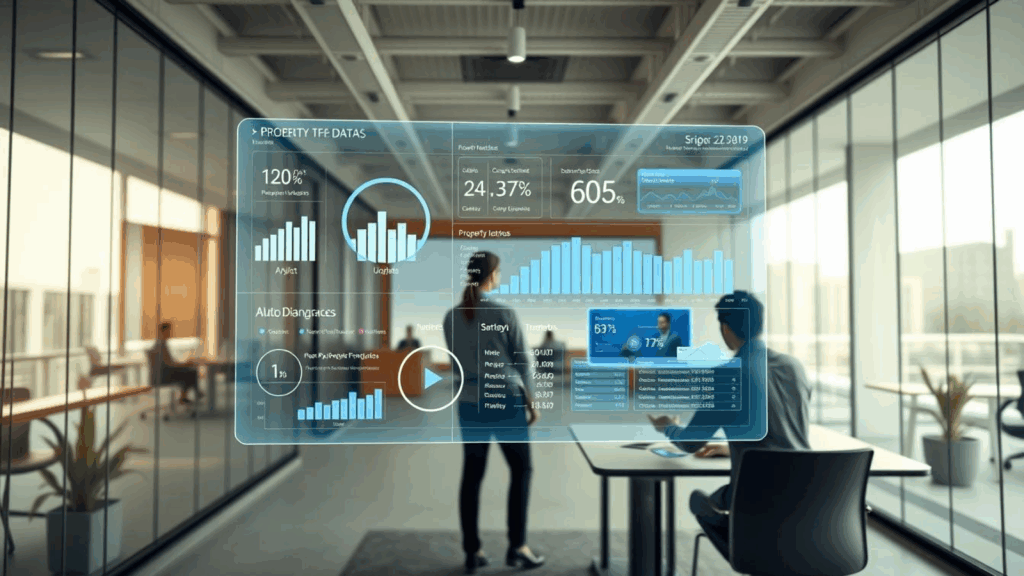Emerging as key players at the nexus of technology and real estate, PropTech companies are shaping a new era. These firms use the latest technologies to make property management more efficient. They’re integrating Smart Home technology and enhancing security with blockchain. Furthermore, they provide virtual reality tours to users.
The advancements offer remote monitoring solutions and real-time information, which improve urban living connectivity. Despite facing hurdles such as regulatory restrictions and gaining industry trust, the vision for a technology-guided, user-focused real estate market is strong.
Key Takeaways
- PropTech companies are revolutionizing real estate management.
- Smart Home technology improves connectivity and convenience.
- Blockchain ensures secure and transparent transactions.
- Immersive virtual experiences enhance property engagement.
- Tech-driven insights contribute to efficient urban living.
The Emergence of PropTech in Real Estate
The real estate tech revolution is reshaping our interaction with property. Driven by a surge in innovation from property technology firms, this transition is significant. We will explore what PropTech is and the main innovations fueling this shift.
Defining PropTech
PropTech, or property technology, merges real estate with technology. It introduces digital solutions to improve how we search, buy, rent, sell, and manage properties. Its primary goal is streamlining processes and enhancing user experiences.
Key Innovations in PropTech
Innovative property tech businesses are leading the charge in the real estate sector. They introduce groundbreaking changes that are key to this transformation. These include:
- Smart Home Integration: Using IoT devices for better home automation and energy management.
- Blockchain Security: Applying blockchain technology for secure, transparent property transactions.
- Advanced Data Analytics: Employing big data for insights into market trends and efficiency.
- Virtual and Augmented Reality: Providing VR/AR experiences for enhanced property tours and visualization.
This embrace of tech advancements marks a significant revolution in real estate. It is steering the sector towards a more efficient, user-centric future.
How PropTech is Revolutionizing Property Management
Proptech pioneers are reshaping property management through cutting-edge technology. They’re blending proptech with time-honored management tactics. This fusion leads to smoother operations and better tenant services. Let’s delve into the profound changes brought about by proptech.
Streamlined Maintenance Processes
Property managers are harnessing proptech to simplify maintenance activities. They’re utilizing automated systems for scheduling tasks and applying IoT for preventative maintenance. These advancements facilitate instantaneous oversight and quick resolution of issues. The result is less disruption and an improved tenant experience.
Enhanced Security Measures
Smart technologies’ integration into property management has elevated security levels. These advanced systems offer immediate monitoring and alerts. This proactive stance safeguards properties and heightens tenant confidence and contentment.
Improved Tenant Communication
Proptech has transformed tenant-management interactions, enhancing tenant relations. Modern communication tools allow for swift service responses and stronger landlord-tenant bonds. This leads to a more agreeable living setting, improving tenant contentment.
The Role of Smart Home Technology
The integration of smart home technology in real estate marks a pivotal change in how we live. By implementing Internet of Things (IoT) devices, homeowners gain unparalleled control and comfort. This advancement is crucial for improving life quality, ensuring efficient energy use, and smoothing our daily routines.
Leading this change, proptech startups utilize smart devices to automate home functions. These innovations contribute to a more efficient urban living environment, enhancing security and convenience. Innovations like remote surveillance, automated fixtures, and environmental controls allow for a bespoke, adaptive dwelling.
This progression toward interconnected living environments is laying the groundwork for a smart technology-driven future. The adoption of IoT in homes enables optimal energy resource management. This leads to significant cost reductions and eco-friendly advantages. Additionally, the information gathered by these intelligent systems provides key insights. These insights enhance both the occupant’s and property manager’s ability to respond and adjust to living conditions.
Today, smart home technology in real estate has moved beyond a mere luxury. It’s an essential part of adapting to rapidly evolving urban ecosystems. It facilitates the move towards intelligent cities and communities, promoting a sustainable, efficient urban living approach.
- Enhanced security through real-time monitoring
- Automated climate and lighting control
- Energy-saving functionalities
- Improved comfort and convenience
The extensive adoption of smart home functionalities underlines their substantial value in residences. This technology arms inhabitants with the means to refine their living spaces. It elevates day-to-day life into a highly optimized, delightful experience.
| Feature | Benefit |
|---|---|
| IoT Integration | Remote control and real-time monitoring |
| Energy Efficiency | Reduced utility costs and environmental impact |
| Security Systems | Enhanced safety and peace of mind |
| Automated Controls | Improved comfort and convenience |
The Impact of Blockchain on Real Estate Transactions
Blockchain technology’s growth significantly influences the real estate industry. It revolutionizes transaction methods, bolstering transparency and security. Its decentralized nature ensures the integrity of data, mitigating fraud and error risks.
Transparent and Secure Transactions
Blockchain introduces the capability for transparent and secure property tech transactions. Its immutable ledger ensures every deal is permanent, protecting data from being altered. This guarantees trust among all parties, leading to more secure transactions and fewer disputes.
The Role of Smart Contracts
Smart contracts represent a major innovation brought about by blockchain. Running on decentralized networks, they enforce agreements automatically once conditions are met. This cuts out middlemen, reducing costs and transaction times, thus enhancing efficiency and trust in real estate ventures.
Below is a table presenting the key benefits of blockchain in real estate transactions:
| Feature | Benefit |
|---|---|
| Transparency | Ensures all transaction details are visible and verifiable |
| Security | Data is encrypted and distributed, reducing fraud risks |
| Efficiency | Automates processes through smart contracts |
| Cost Reduction | Reduces intermediary costs and speeds up transactions |
Blockchain technology doesn’t just boost security and transparency in real estate deals. It also fosters a more dependable and effective real estate ecosystem.
Virtual and Augmented Reality in Real Estate
Virtual reality is revolutionizing real estate, altering how customers see properties. It uses virtual and augmented reality technologies. These tools enable immersive property tours, making listings more engaging. Thus, they enhance the buying journey for potential customers.
Virtual Tours and Immersive Experiences
Virtual reality offers a notable innovation: virtual tours. Buyers can move through properties as though they were there in person. Unlike basic images, these tours show dynamic, panoramic views. They feature interactive details and high-quality visuals. Through these, buyers can closely examine properties from afar.
Enhancing Buyer Engagement
Augmented reality boosts buyer interest by blending digital data with physical environments. It lets buyers picture changes like new furnishings or remodels right in the property. This blend of technologies grabs buyers’ attention. It also gives them a realistic understanding and visualization of properties before visiting.
Data Analytics and Predictive Technology in Real Estate
In the evolving landscape of real estate, the integration of data analytics and predictive proptech is crucial. These technologies are key to understanding market trends and spotting lucrative investment opportunities. By analyzing vast datasets, analysts provide stakeholders with insights that fuel smart decision-making.
Market Trends and Investment Opportunities
Data analytics reveals patterns in real estate market trends that might be overlooked. This analysis aids in property investment, letting investors identify opportunities early. With predictive proptech, forecasting market trends becomes possible. This allows investors to adjust their portfolios in anticipation of future market changes.
Optimizing Property Valuation
Optimizing property valuation is a significant benefit of using data analytics in real estate. Predictive proptech looks at various data points to make property appraisals more accurate. This thorough analysis ensures property values are assessed reliably. It results in better investments and enhances market stability.
Sustainable Innovations in PropTech
The PropTech sector is advancing with a clear emphasis on sustainability. This move towards eco-friendly practices indicates a firm resolve to minimize the environmental impact of the real estate industry. Properties are now seeking ways to be both efficient and eco-responsible. These changes herald a wider shift towards sustainable living and workspaces.
Eco-friendly Solutions
Sustainable proptech solutions focus on green real estate innovations that cut waste and encourage recycling. These include smart water management systems, use of sustainable building materials, and green roofs. Green roofs boost energy efficiency and biodiversity. By adopting eco-friendly construction methods, operational costs are reduced, and healthier living environments are created.
Energy-efficient Buildings
Creating buildings that use less energy is a cornerstone of green innovation in real estate. Modern PropTech employs technologies like solar panels, energy-saving HVAC systems, and intelligent lighting. These innovations are key to reducing energy use and cutting greenhouse gas emissions. Through these sustainable proptech solutions, the industry is making strides in lessening buildings’ environmental effects.
Let’s look at a comparative table showing various sustainable solutions and their advantages:
| Solution | Environmental Benefits | Cost Savings |
|---|---|---|
| Smart Water Management | Reduces Water Waste | Lower Water Bills |
| Solar Panels | Decreases Carbon Footprint | Significant Energy Savings |
| Green Roofs | Improves Air Quality | Enhances Insulation |
| Energy-efficient HVAC Systems | Minimizes Energy Usage | Lower Maintenance Costs |
The Challenges Facing PropTech Companies
The PropTech industry, despite being at the forefront of innovation, encounters significant challenges. These obstacles must be overcome for progress and wider acceptance in real estate. Addressing these issues is key for PropTech’s continuous growth and its integration into the real estate market.
Regulatory Considerations
Navigating complex regulatory environments is one of the main challenges. The need to comply with laws governing real estate, privacy, and tech use is crucial. Regulations differ widely by area, requiring PropTech firms to be well-informed and flexible.
Industry Acceptance
Gaining acceptance in traditional real estate markets presents a major barrier. Established practices and stakeholders often resist change. Companies must highlight their technology’s benefits through pilots, success stories, and compelling client testimonials. Winning trust and proving value are crucial for securing market presence.
Widespread Adoption
Ensuring widespread adoption is challenging. Many potential users remain either unaware of the benefits or hesitant about new technologies. Offering thorough education and training is vital to overcome these barriers. With the right knowledge and ease of integration, PropTech can achieve greater acceptance and usage.
Overall, tackling regulatory challenges, gaining industry acceptance, and achieving widespread adoption are key. Strategic and cooperative efforts are essential. Addressing these challenges effectively will propel growth and innovation in real estate with PropTech at the helm.
The Future of PropTech: Trends to Watch
PropTech’s future is being defined by smart technology and AI’s progress. These innovations are making property management more efficient, automated, and tailored to individual needs.
Advancements in AI
AI is transforming real estate technology. It ranges from enhancing building operations to improving tenant interactions. Through predictive analytics powered by AI, property managers get insights for better maintenance planning. This optimization leads to lower costs. Additionally, AI chatbots are upgrading tenant communication, ensuring rapid replies and smoother services.
Integration of Smart Technologies
The infusion of smart technology into property is a key trend in PropTech. Homes and commercial spaces are increasingly incorporating IoT devices. These devices offer real-time insights and elevate property management. Their use leads to better remote supervision, energy savings, and ahead-of-time maintenance. This bolsters a stronger property management system.
| Trend | Impact | Examples |
|---|---|---|
| AI in Real Estate Tech | Boosts preventive maintenance, enhances tenant interaction, and improves resource use | Chatbots, Predictive Analytics |
| Smart Technologies in Property | Facilitates remote management, increases energy efficiency, and promotes proactive upkeep | IoT Devices, Smart Sensors |
Looking ahead, AI and smart technologies will be instrumental in evolving real estate services. They will enhance efficiency and introduce smarter, more personalized management solutions. The continuous tech advancements position the PropTech sector for substantial growth and innovation.
How PropTech is Enhancing Tenant Experiences
Modern PropTech is radically changing how tenants live, making life more convenient and secure. These innovations improve everyday life and boost residents’ security. We will explore how enhanced residential technology and safety innovations are transforming tenant experiences.
Smart Home Devices for Tenants
PropTech brings smart home devices to tenant experiences, offering unmatched convenience and control. Technologies like smart thermostats and lighting systems let tenants efficiently manage their homes. They can control these devices remotely via smartphones, which saves energy and adds comfort.
Improving Tenant Safety
PropTech also concentrates on innovations that make living safer for tenants. Advanced security systems with real-time monitoring and smart locks enhance tenant security. The addition of surveillance cameras and access control systems offers an extra security layer. This technology resolves safety issues and gives tenants peace of mind.
Conclusion
The evolution of the Proptech industry is revolutionizing real estate management for the next generation. These innovative companies are driving a major transformation by integrating advanced technologies. Their efforts streamline operations, secure transactions, and improve living and working spaces. This significant shift is enhancing efficiency and reshaping traditional approaches. It marks a pivotal point in the real estate sector.
Proptech faces challenges like regulatory compliance and industry adoption as it evolves. However, the ongoing efforts to overcome these barriers highlight the resilience and adaptability of Proptech players. By leveraging technology for more connected, efficient, and user-centric solutions, the Proptech industry’s evolution keeps moving upwards. It promises a brighter, smarter future for real estate.
The future of real estate management lies in the seamless integration of cutting-edge technologies. With continuous advancements, Proptech is set to redefine industry standards. It aims to foster a more technologically enriched and sustainable ecosystem. The real estate tech transformation is more than an industry trend. It’s a testament to the significant progress toward a more innovative and unified real estate environment.
FAQ
What are PropTech companies?
PropTech companies, also known as property technology firms, employ technology to revolutionize the real estate sector. They improve property management, transactions, and the overall tenant experience through innovative approaches.
How do PropTech startups impact real estate management?
PropTech startups bring a transformative impact to real estate management. They utilize advanced data analytics, IoT devices, and automation. These technologies streamline maintenance, bolster security, and foster better communication between tenants and landlords.
What key innovations define the PropTech revolution?
The PropTech revolution is marked by significant innovations. Among them are Smart Home technology, blockchain for secure transactions, and advanced data analytics. Additionally, virtual/augmented reality experiences play a crucial role. Together, they enhance efficiency, bolster security, and improve the real estate user experience.
How is Smart Home technology integrated in real estate?
The integration of Smart Home technology in real estate involves embedding IoT devices. These devices offer residents enhanced control over their living spaces. They contribute to greater comfort and energy efficiency. This leads to a smarter and more connected urban living experience.
In what ways does blockchain enhance real estate transactions?
Blockchain substantially improves real estate transactions. It brings transparency, ensures security, and aids in fraud prevention through its decentralized nature. Additionally, smart contracts on blockchain automate transactions. This increases efficiency and trust in deals.
How do Virtual and Augmented Reality benefit real estate?
Virtual and Augmented Reality offer substantial benefits in real estate. They provide immersive property tours and boost buyer engagement. With these technologies, potential buyers can extensively explore properties remotely. This reduces the dependency on physical site visits.
Why are data analytics and predictive technologies important in real estate?
Data analytics and predictive technologies hold significant importance in real estate. They are pivotal in analyzing market trends and optimizing property valuations. Furthermore, they identify lucrative investment opportunities. These tools offer valuable, data-driven insights. They are essential for making informed decisions and ensuring market stability.
What sustainable innovations are propelled by PropTech?
PropTech drives a range of sustainable innovations. These include eco-friendly solutions and energy-efficient building designs. Moreover, technologies that reduce environmental footprints are also introduced. These initiatives support global sustainability objectives. Plus, they improve the sustainability of the real estate scene.
What challenges do PropTech companies face?
PropTech companies encounter several challenges. One major issue is navigating regulatory frameworks. Another is gaining acceptance within the industry. Additionally, achieving widespread adoption remains a hurdle. Overcoming these requires cooperation among startups, established firms, and regulators.
What trends should we watch in the future of PropTech?
The future of PropTech is likely to see significant trends. These include advancements in AI and the integration of smart technologies. Also, a shift towards personalized and automated property management is anticipated. Such trends promise to fuel further innovation and increase efficiency within the real estate industry.
How does PropTech enhance tenant experiences?
PropTech significantly improves tenant experiences. It does so by employing smart home devices which elevate convenience, control, and efficiency. Advanced detection and monitoring systems also play a critical role. They guarantee safer and more satisfying living conditions for tenants.






